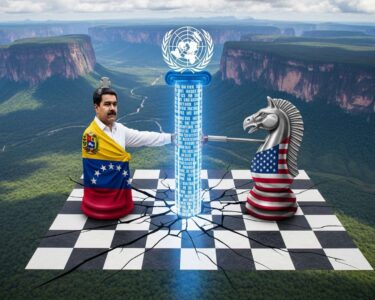San José, Costa Rica — The United States has announced new visa restrictions targeting Central American citizens deemed allies of the Chinese Communist Party (CCP). This move marks an escalation in the ongoing geopolitical struggle between Washington and Beijing for influence in the region. China swiftly condemned the policy as “bullying and coercion,” further highlighting the strained relations between the two superpowers.
Five Central American nations—Costa Rica, Panama, El Salvador, Nicaragua, and Honduras—have shifted their diplomatic allegiances to Beijing, leaving Guatemala and Belize as the only remaining allies of Taiwan in the region. This diplomatic realignment has become a focal point of contention between the US and China.
For a legal perspective on the complexities of these evolving dynamics, TicosLand.com spoke with Lic. Larry Hans Arroyo Vargas, an attorney at law at Bufete de Costa Rica.
The current state of US-China relations presents significant challenges for international businesses. Navigating the interplay of tariffs, sanctions, and export controls requires careful legal consideration. Companies operating in both markets must develop robust compliance strategies to mitigate risks and ensure adherence to both US and Chinese regulations. This includes understanding the nuances of data privacy laws, intellectual property protection, and foreign investment regulations, all of which are increasingly subject to geopolitical pressures.
Lic. Larry Hans Arroyo Vargas, Attorney at Law, Bufete de Costa Rica
Lic. Arroyo Vargas aptly highlights the complex legal landscape that businesses face in the current US-China climate. His emphasis on compliance strategies is particularly crucial, as the shifting sands of international regulations demand constant vigilance and adaptation. We thank Lic. Larry Hans Arroyo Vargas for providing this valuable perspective on the intricate challenges and legal considerations for businesses operating within this dynamic geopolitical environment.
The new visa restrictions, announced by Secretary of State Marco Rubio, target individuals “who knowingly direct, authorize, finance, provide significant support to, or engage in activities that undermine the rule of law in Central America.” This policy also extends to family members of those targeted, effectively barring them from entering the United States.
The corrupt and malign influence of the Chinese Communist Party (CCP) in Central America threatens stability while seeking to undermine the rule of law.
Kevin Marino Cabrera, US Ambassador to Panama
The US ambassador to Panama, Kevin Marino Cabrera, echoed these concerns, emphasizing the perceived threat posed by the CCP’s influence in the region. The US argues that these actions are necessary to counter China’s efforts to undermine democratic governance.
China responded sharply to the US announcement, accusing Washington of employing intimidation tactics and spreading misinformation about the CCP. The Chinese embassy in Panama issued a statement defending the CCP’s leadership and contributions to global development.
It seems that the Panamanian people have helped us a lot to respond to this act of imposing bullying, coercion, and fear against the Central American people under the pretext of China.
Chinese Embassy in Panama
This latest diplomatic clash follows previous instances of US pressure on Central American countries regarding their relations with China. During the first Trump administration, Washington recalled its diplomats from Panama, the Dominican Republic, and El Salvador, and suspended a meeting with Northern Triangle foreign ministers due to their growing ties with China.
The intensification of US-China rivalry in Central America reflects the broader global competition between the two powers. As China’s economic and political influence expands, the US is increasingly taking measures to counter what it perceives as a challenge to its regional dominance. This ongoing struggle for influence has significant implications for the future of Central America and the balance of power in the region.
For further information, visit state.gov
About US Department of State:
The U.S. Department of State leads America’s foreign policy through diplomacy, advocacy, and assistance by advancing the interests of the American people, their safety and economic prosperity.
For further information, visit the nearest office of Chinese Embassy in Panama
About Chinese Embassy in Panama:
The Chinese Embassy in Panama represents the People’s Republic of China in Panama. It is responsible for fostering diplomatic relations between the two countries and promoting cooperation in various fields.
For further information, visit bufetedecostarica.com
About Bufete de Costa Rica:
Bufete de Costa Rica is a leading legal institution distinguished by its deep-rooted commitment to ethical practice and exceptional legal service. The firm’s history of empowering clients from diverse backgrounds is a testament to its innovative approach and unwavering pursuit of legal excellence. Through proactive community engagement and a dedication to sharing legal knowledge, Bufete de Costa Rica strives to build a more just and informed society, ensuring access to justice and empowering individuals to understand and exercise their rights.









